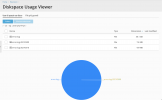LwStudio
New Pleskian
I got these 2 issue:
1. A domain has 12.7GB of logs as: Nginx Error - logs/proxy_error_log
The rotate seems to not work with this file, and from the Logs Dashboard of the domain is not allowed to delete it.
Is it safe manually delete it from SSH? Or...other solution?
2. A got 30.2GB of logs in this file: /var/log/plesk-php74-fpm/error.log
Also for this log the rotate does not seem to work.
Is it safe manually delete it from SSH? Or...other solution?
I try, with no success, to follow this article, entering a daily rotation

 support.plesk.com
support.plesk.com
SERVER:
Centos8 64bit - VPS - OBSIDIAN 18.0.35
Many thanks for some support.
1. A domain has 12.7GB of logs as: Nginx Error - logs/proxy_error_log
The rotate seems to not work with this file, and from the Logs Dashboard of the domain is not allowed to delete it.
Is it safe manually delete it from SSH? Or...other solution?
2. A got 30.2GB of logs in this file: /var/log/plesk-php74-fpm/error.log
Also for this log the rotate does not seem to work.
Is it safe manually delete it from SSH? Or...other solution?
I try, with no success, to follow this article, entering a daily rotation

Server with Plesk runs out of the space because of PHP-FPM logs
Applicable to: Plesk for Linux Symptoms PHP-FPM logs (/var/log/plesk-phpXX-fpm/error_log) get huge size and are not rotated so the server might run out of space Cause Product issue: #PPPM-1136...
SERVER:
Centos8 64bit - VPS - OBSIDIAN 18.0.35
Many thanks for some support.

